We may not have the course you’re looking for. If you enquire or give us a call on +48 221041849 and speak to our training experts, we may still be able to help with your training requirements.
Training Outcomes Within Your Budget!
We ensure quality, budget-alignment, and timely delivery by our expert instructors.
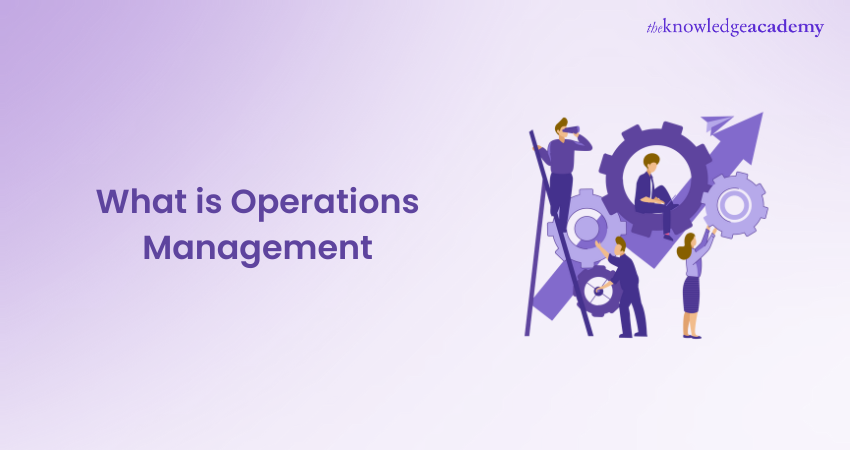
Have you ever wondered how a company like Amazon can deliver millions of products to customers worldwide in a timely and cost-effective manner? The answer to all these questions lies in one word: Operations Management. But What is Operations Management?
In this blog, we will delve into “What is Operations Management?” in detail. Read along to learn about its principles, roles, and more.
Table of Contents
1) Understanding What is Operations Management?
2) What is the purpose of Operations Management?
3) Benefits of Operations Management
4) Principles of Operations Management
5) Roles in Operations Management
6) Essential skills for an Operations Manager
7) Example of Operations Management in action
8) Conclusion
Understanding What Is Operations Management?
Operations Management can be defined as the administration of business practices to create the highest level of efficiency possible within an organisation. It is concerned with converting materials and labour into goods and services as efficiently as possible to maximise an organisation's profit.
Operations Management encompasses multiple aspects of a business, such as:
a) Product design and development
b) Quality Management and Control
c) Inventory Management and control
d) Supply Chain Management and logistics
e) Capacity planning and scheduling
f) Project Management and process improvement
g) Performance measurement and evaluation
Operations Management applies to both manufacturing and service sectors, although the nature and scope of operations may vary depending on the type and size of the organisation. For example, a manufacturing firm may focus more on production planning and control, while a service firm may emphasise service delivery and customer satisfaction.
What is the purpose of Operations Management?
The main purpose of Operations Management is to align an organisation's operations with its strategic goals and objectives. By doing so, Operations Management aims to achieve the following outcomes:
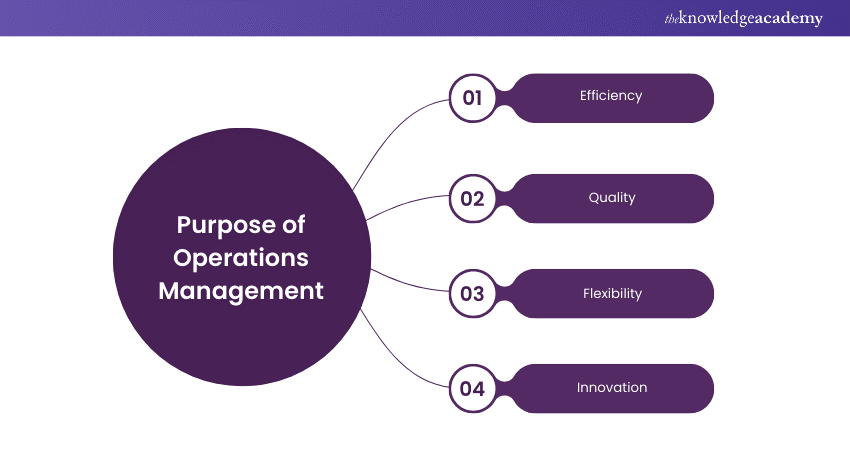
a) Efficiency: Operations Management strives to optimise the use of resources and minimise waste and costs. It seeks to eliminate non-value-adding activities and improve the productivity and performance of the operations.
b) Quality: Operations Management ensures that the goods and services produced and delivered meet or exceed the expectations and requirements of the customers. It implements quality standards and controls to prevent defects and errors and enhance customer satisfaction and loyalty.
c) Flexibility: Operations Management enables an organisation to adapt to the market's and customers' changing needs and demands. It allows an organisation to offer various products and services, customise them according to customer preferences, and respond quickly to fluctuations in demand and supply.
d) Innovation: Operations Management fosters an organisation's culture of creativity and innovation. It encourages an organisation to develop new and improved products and services, explore new markets and opportunities, and leverage new technologies and methods to gain a competitive edge.
Benefits of Operations Management
Operations Management is important for any organisation because it directly affects its performance and profitability. Some of the benefits of effective Operations Management are:
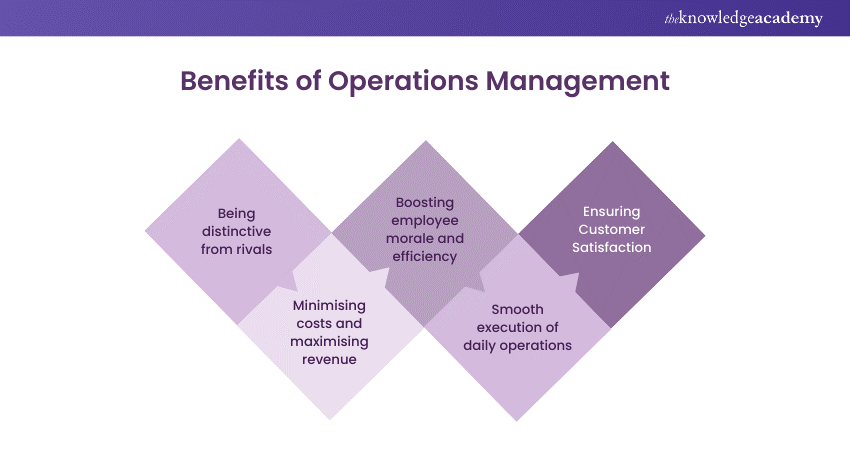
Being distinctive from rivals
Operations Management helps an organisation to differentiate itself from its competitors by offering unique and superior value to its customers. It enables an organisation to create a competitive advantage by delivering products and services that are better, faster, cheaper, or more customised than those of its rivals.
Minimising costs and maximising revenue
Operations Management helps an organisation reduce its operating costs and increase its revenue. It does so by streamlining the processes, eliminating waste, improving quality, and increasing output and sales. By doing so, Operations Management enhances the profitability and growth of an organisation.
Boosting employee morale and efficiency
Operations Management helps an organisation improve its employees' working conditions and satisfaction. It provides clear roles and responsibilities, adequate training and development, fair rewards and recognition, and constructive feedback and support. By doing so, Operations Management motivates employees to work harder and smarter, improving their morale and efficiency.
Smooth execution of daily operations
Operations Management helps an organisation to ensure the smooth execution of its daily operations. It does so by planning and scheduling the activities, allocating and managing the resources, monitoring and controlling the processes, and resolving any issues and problems. By doing so, Operations Management prevents disruptions and delays and ensures the timely and quality delivery of goods and services.
Ensuring customer satisfaction
Operations Management helps an organisation to ensure the satisfaction and retention of its customers. It does so by understanding and meeting the needs and expectations of the customers, providing reliable and consistent quality and service, and handling any complaints and feedback. By doing so, Operations Management builds trust and loyalty among the customers and enhances the reputation and image of the organisation.
Empower your remote team's success with our comprehensive Managing Remote Teams Course!
Principles of Operations Management
Operations Management is guided by fundamental principles that help an organisation achieve its operational goals and objectives. These principles are:
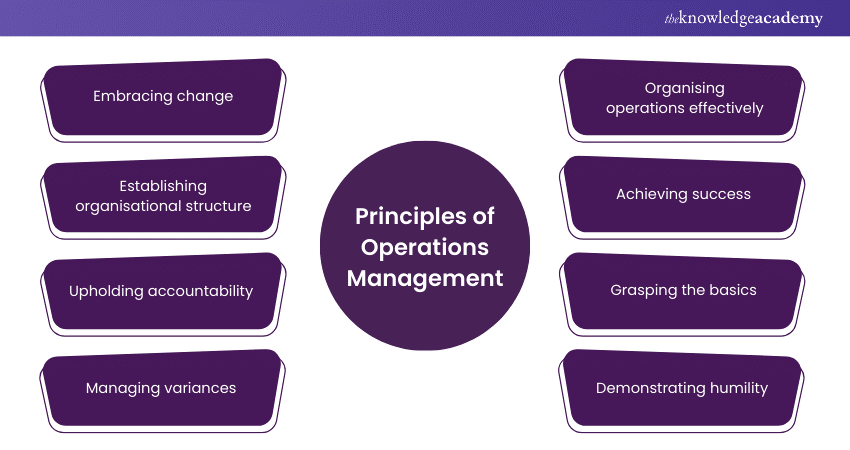
Embracing change
Operations Management recognises that change is inevitable and necessary for an organisation to survive and succeed in a dynamic and competitive environment. It embraces change as an opportunity to improve and innovate rather than a threat to resist and avoid. It anticipates and prepares for the changes in the market and the customer demands and adapts and responds accordingly.
Establishing organisational structure
Operations Management establishes a clear and effective organisational structure that defines the roles and responsibilities of the people involved in the operations. It assigns the tasks and authority to the appropriate individuals or teams and coordinates and communicates among them. It also establishes the rules and policies governing the operations and ensures compliance and enforcement.
Upholding accountability
Operations Management upholds accountability for the results and outcomes of the operations. It sets the goals and objectives for the operations and measures and evaluates their performance and progress. It also identifies and analyses the gaps and deviations and takes corrective and preventive actions. It also rewards and recognises the achievements and contributions and provides feedback and support.
Managing variances
Operations Management manages the variances and uncertainties that affect the operations. It identifies and assesses the risks and opportunities that may arise from the internal and external factors and plans and implements the strategies and actions to mitigate or exploit them. It also monitors and controls the variations and fluctuations in the demand and supply and adjusts the capacity and inventory accordingly.
Organising operations effectively
Operations Management organises the operations effectively and efficiently. It designs and implements the processes and systems that transform the inputs into outputs. It also optimises the layout and flow of the operations and integrates the technology and equipment that support the operations. It also ensures the quality and safety of the operations and eliminates any defects and errors.
Achieving success
Operations Management achieves success for the organisation and its stakeholders. It aligns the operations with the vision and mission of the organisation and contributes to its strategic goals and objectives. It also delivers customer value and satisfaction and meets or exceeds their expectations and requirements. It also generates profit and growth for the organisation and creates a competitive advantage in the market.
Grasping the basics
Operations Management grasps the basics of operations. It understands the nature and scope of the operations and the resources and activities involved. It also knows the customers, the market, and their needs and expectations. It also follows the industry's best practices and standards and learns from others' experiences and examples.
Demonstrating humility
Operations Management demonstrates humility and respect for the operations and the people involved. It acknowledges the limitations and challenges of the operations and seeks to overcome them. It also appreciates and celebrates the efforts and achievements of the operations. It also listens and responds to the feedback and suggestions of the customers and the employees and strives to improve and excel.
Elevate your leadership prowess with our Senior Management Training – sculpting strategic visionaries for tomorrow's success!
Roles in Operations Management
Operations Management involves various roles and responsibilities essential for the operations' successful functioning. Some of the common roles in Operations Management are:
Overseeing supply chain
One of the roles in Operations Management is to oversee the organisation's supply chain. The supply chain is the network of suppliers, manufacturers, distributors, retailers, and customers involved in creating and delivering goods and services. The role of Operations Management is to manage and coordinate the supply chain and ensure its efficiency, quality, and reliability.
It also involves sourcing and procuring the materials and components, negotiating and contracting with the suppliers, managing the inventory and transportation, and maintaining the relationships with the partners.
Managing deliveries
Another role in Operations Management is to manage the deliveries of goods and services to the customers. The role of Operations Management is to plan and schedule the deliveries and ensure their timeliness and accuracy.
It also involves tracking and tracing the shipments, handling the orders and invoices, resolving issues and disputes, and providing customer service and support.
Guiding product design
Another role in Operations Management is to guide the product design and development of the organisation. Product design and development is the process of creating and improving the goods and services the organisation offers customers.
The role of Operations Management is to provide input and feedback for product design and development and ensure its feasibility, viability, and desirability.
Conducting forecasting
Another role in Operations Management is to conduct forecasting for the organisation. Forecasting predicts the future demand and supply of goods and services and the resources and activities required to meet them. The role of Operations Management is to use various methods and tools to conduct forecasting and ensure its accuracy and reliability.
It also involves analysing the data and trends, identifying and assessing the uncertainties and risks, and planning and implementing contingency measures.
Optimise your operations with our Operations Management Training for peak efficiency and excellence!
Essential skills for an Operations Manager
Operations Management requires skills and competencies essential for an Operations Manager to perform the roles and responsibilities effectively and efficiently. Some of the essential skills for an Operations Manager are:
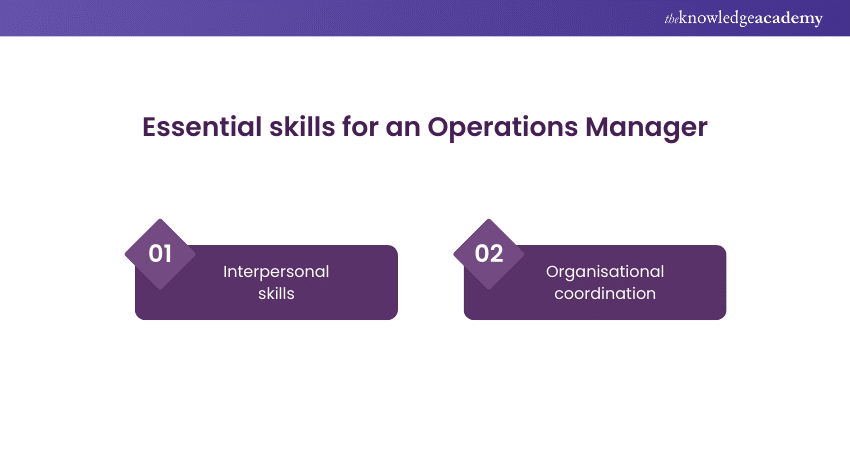
Interpersonal skills
Interpersonal skills enable an Operations Manager to communicate and interact with others positively and constructively. Interpersonal skills include verbal and non-verbal communication, listening, negotiation, persuasion, conflict resolution, teamwork, and leadership. Because they help build and maintain relationships with customers, suppliers, employees, and other stakeholders. Additionally, they help influence and motivate them to achieve operational goals and objectives.
Organisational coordination
Organisational coordination is the skill that enables an Operations Manager to coordinate and integrate the various elements and aspects of the operations. Organisational coordination includes planning, organising, directing, controlling, and evaluating the operations and ensuring their alignment and consistency with the organisational strategy and vision. Organisational coordination is important for an Operations Manager because it helps optimise the use of resources and time and ensures the quality and efficiency of the operations.
Example of Operations Management in action
To illustrate how Operations Management works in practice, let us consider an example of a company that is well-known for its excellence in Operations Management:
Apple is a global leader in designing, developing, and marketing innovative products and services, such as the iPhone, iPad, Mac, Apple Watch, AirPods, Apple TV, and Apple Music. Apple’s success is largely attributed to its effective and efficient Operations Management, which enables it to create and deliver high-quality and distinctive products and services to its customers.
Some of the aspects of Apple’s Operations Management are:
Product design and development
Apple is renowned for its product design and development, which is driven by its vision of creating products that are simple, elegant, and user-friendly. Apple’s product design and development process involves extensive research and analysis, prototyping and testing. It also involves feedback and refinement to ensure that the products meet the customer's needs and expectations and reflect the Apple brand and identity.
Quality Management and Control
Apple is committed to ensuring the quality and reliability of its products and services and maintaining its reputation and image. Apple’s Quality Management and Control process involves setting and enforcing high standards and specifications. It also involves conducting rigorous inspections and audits and implementing corrective and preventive actions to prevent defects and errors and enhance customer satisfaction and loyalty.
Supply Chain Management and logistics
Apple manages a complex and global supply chain that involves hundreds of suppliers, manufacturers, distributors, and retailers who are involved in the creation and delivery of its products and services.
Apple’s Supply Chain Management and logistics process involves sourcing and procuring the materials and components, negotiating and contracting with the suppliers. It also involves managing the inventory and transportation and maintaining the relationships with the partners to ensure the supply chain's efficiency, quality, and reliability.
Capacity planning and scheduling
Apple schedules its capacity and activities to meet the demand and supply of its products and services. Apple’s capacity planning and scheduling process involves forecasting the demand and supply. It also involves analysing the data and trends and identifying and assessing the uncertainties and risks. Finally, the process involves planning and implementing contingency measures to ensure the timeliness and accuracy of the deliveries.
Performance measurement and evaluation
Apple measures and evaluates its performance and progress regarding its operational goals and objectives. Apple’s performance measurement and evaluation process involves setting and tracking the Key Performance Indicators (KPIs). The KPIs include sales, revenue, profit, market share, customer satisfaction, and innovation. The process also involves comparing the KPIs with the benchmarks and targets to identify and analyse the gaps.
Take the first step to becoming a great Manager by registering for our Introduction To Management Course now!
Conclusion
Operations Management is managing the creation and delivery of goods and services. It involves planning, organising, controlling, and improving an organisation's operations. It also involves aligning the operations with the organisational strategy and vision and delivering customer value and satisfaction. What is Operations Management? It is the way of making things happen efficiently and effectively.
Learn different approaches to Management skills with our Introduction To Managing People course. Join today!
Frequently Asked Questions

There are two main types of Operations Management: Manufacturing Operations Management and Service Operations Management.

Some possible challenges of Operations Management are:
a) Globalisation and competition
b) Complexity and uncertainty
c) Customer demands and expectations
d) Costs
e) Regulation and compliance

The Knowledge Academy takes global learning to new heights, offering over 30,000 online courses across 490+ locations in 220 countries. This expansive reach ensures accessibility and convenience for learners worldwide.
Alongside our diverse Online Course Catalogue, encompassing 17 major categories, we go the extra mile by providing a plethora of free educational Online Resources like News updates, Blogs, videos, webinars, and interview questions. Tailoring learning experiences further, professionals can maximise value with customisable Course Bundles of TKA.

The Knowledge Academy’s Knowledge Pass, a prepaid voucher, adds another layer of flexibility, allowing course bookings over a 12-month period. Join us on a journey where education knows no bounds.

The Knowledge Academy offers various Management Courses, including Introduction to Management, Introduction to Managing People and Senior Management Training. These courses cater to different skill levels, providing comprehensive insights into the Principles of Management.
Our Business Skills blogs cover a range of topics related to Management, offering valuable resources, best practices, and industry insights. Whether you are a beginner or looking to advance your Management skills, The Knowledge Academy's diverse courses and informative blogs have you covered.
Upcoming Business Skills Resources Batches & Dates
Date
 Operations Management Training
Operations Management Training
Fri 28th Feb 2025
Fri 4th Apr 2025
Fri 27th Jun 2025
Fri 29th Aug 2025
Fri 24th Oct 2025
Fri 5th Dec 2025







 Top Rated Course
Top Rated Course



 If you wish to make any changes to your course, please
If you wish to make any changes to your course, please


